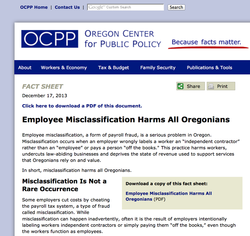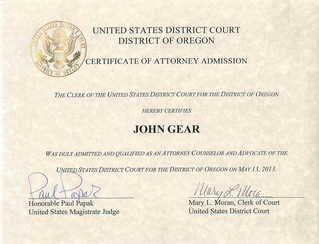| Building on our earlier Institute report by Prof. Imre Szalai of the Loyola College of Law, Forced Arbitration: A Race To The Bottom breaks down the “what, how, & why” of forced arbitration and reveals that at least 52 Fortune 100 companies use forced arbitration in their employment contracts. Of those, 30 also ban employees from joining any class, collective, or joint legal actions when wronged in the workplace—a number that is likely to increase in the wake of the U.S. Supreme Court’s recent decision in Epic Systems v. Lewis. The report also explores some of the state and federal legislative solutions that potentially are available to protect workers from this harmful practice. | ||
|
0 Comments
Today marks John Gear Law Office's fourth birthday.
I am very grateful to all the clients who have trusted me with their problems and given me the opportunity to help them find solutions. Thanks to your trust and confidence, I have been able to meet my primary practice goal: Making a modest living with a "values-based Oregon law practice" -- where "values-based" means I don't represent the folks trying to take advantage of others, my clients are the ones wronged by those who do. It's not the easiest area of law and it's definitely not the most lucrative, but I think it's the most satisfying. As the Mrs. works towards her M. Div. and ordination as a minister, I am able to have a practice that reflects, rather than conflicts with, the values of a ministry.  It's hard to get people to understand how they're being robbed and denied their rights when it happens without guns or violence. But a lot of times, companies rip off customers and exploit their workers unfairly, and it's not until you try to do something about it that you find out that the company has built itself an "Accountability Shield" that does to the civil justice system what Kryptonite does to Superman -- allows the bad guys to escape the consequences of their wrongdoing, and leaves the good guys weakened or flat-out defeated. Every story needs a hook to get and hold the reader's attention long enough for the message to be received. For a lot of guys, a story about hot young women being mistreated by their employer is a strong enough signal to get their attention, and then they can finally get the message. And, of course, young women, who are often mistreated horribly in the workplace, can understand that even the most superficially exciting jobs can really be terrible grinds -- made much worse by the arbitration clause that essentially lets the company get away with anything short of murder.  This is a very real issue in Oregon, where employees are often persuaded to accept "independent contractor" status, unaware of all the serious ramifications for them down the road. I have represented several workers whose employers have tried to take advantage of them in this way. Don't let your employer do it to you -- it costs you your social security down the road, your workers compensation, and your ability to obtain unemployment insurance, among other things.  Despite the cool certificate, the admission itself is nothing much -- it's what you can do with it that makes it worth having. I have a client with a case that really needs to be brought in federal court. So, despite my strong preference for my walking commute and my distaste for hauling up and down the valley as part of the workday, it's off to federal court I go. I appreciate the opportunity that my veteran client has given me to bring a substantial case that I think will right a substantial wrong. It even makes getting up in time to catch a train at 0642 worth it. Thank goodness for Amtrak. Lots of people have their wages stolen -- not just undocumented immigrants (whom the wage laws also protect), but also fully-documented, legal-to-work immigrants and native US-born workers of every kind and color. One of the most common ways unscrupulous employers try to steal wages is by pretending that someone is an "independent contractor" and using that fiction as they seek to evade the minimum wage laws. If your boss is stealing your wages, get help. Contact an attorney.  The time to verify your recordkeeping systems are in place and working well is BEFORE the crash. The case below is a vital reminder for nonprofits of the value of keeping proper records about your organization: Failure to keep accurate records about what employees do cost this small business almost $70,000 in higher worker's comp premiums. The only differences between that business and most nonprofits are (1) that the business will definitely learn from the experience, and (2) that the business will have the resources to pay the higher assessment until the records are straightened out, if they aren't already. If your nonprofit thinks keeping timely and accurate records is just something to aspire to, you and your group are probably at risk in any number of areas. Remember, the prime duty of a board member for a nonprofit is to do what a reasonable and prudent person would do to oversee the affairs of the organization, which means paying attention, which requires timely and accurate records. As a board member, you don't have to check every record yourself, but you have to assure yourself that there is a SYSTEM to make sure that the records are being kept, that there is a SYSTEM so that they are checked as much as necessary to give you confidence that they are accurate, and (most important) that there is a SYSTEM in place so that, if they aren't kept or are being kept poorly, you will quickly know it --- before you get the $70,000 bill.
I advise nonprofits as a key focus in my practice. Like all small businesses, nonprofits struggle with payroll taxes, worker's comp, unemployment insurance, and sometimes the board decides, "hey, I've got an idea, let's just use independent contractors instead of employees." It's possible to do that, but you really have to work hard and take special care to do it right, or you can face penalties and interest on the not-quite-avoided payroll taxes. Remember, authorities at every level (IRS, SAIF, Employment Dept.) have a very serious interest in making sure that only those people who are truly independent contractors get treated that way. And don't think that the "contractor" wanting to be treated that way cuts any ice with anybody. People have a funny way of having memory lapses in times of trouble -- such as when budget cuts force you to drop the contractor, who only then realizes that "independent contractors" can't claim unemployment, or when they fall down the stairs while working for you and only then learn that they don't have any worker's comp coverage (of course, not having worker's comp also might mean that they could have a right of action against your agency for personal injury). If you're only going to know one thing about this area of law it's this: Anyone who does work for pay is an employee unless you establish otherwise, and the burden is on you, the employer to prove otherwise; in other words, if you are using an independent contractor in your nonprofit and someone decides that you have misclassified that person and that you should have been paying payroll taxes on their wages all along, it is you who has to prove them wrong. (If you fight them to a tie on the issue, then you lose, because you failed to carry your burden.) The opinion announced today in Oregon is a well-written, clear cut guide to the issue that anyone who is using independent contractors might want to review and discuss with an attorney versed in this area.
|
AuthorJohn Gear Law Office - Categories
All
Archives
December 2022
|
||||||||||||


 RSS Feed
RSS Feed
